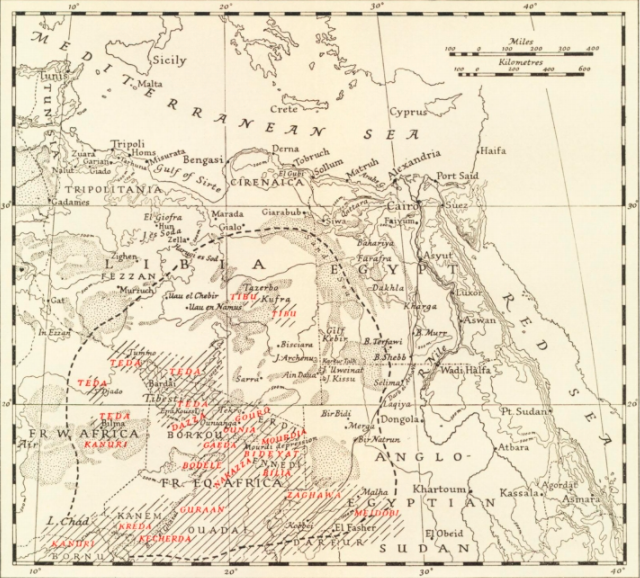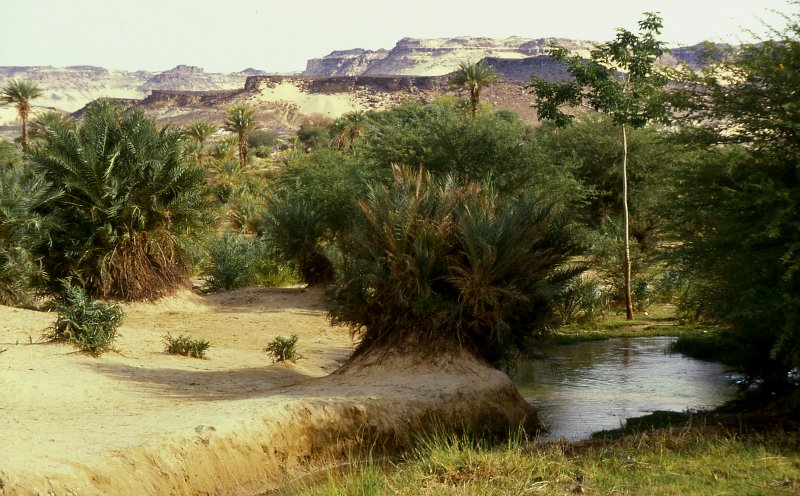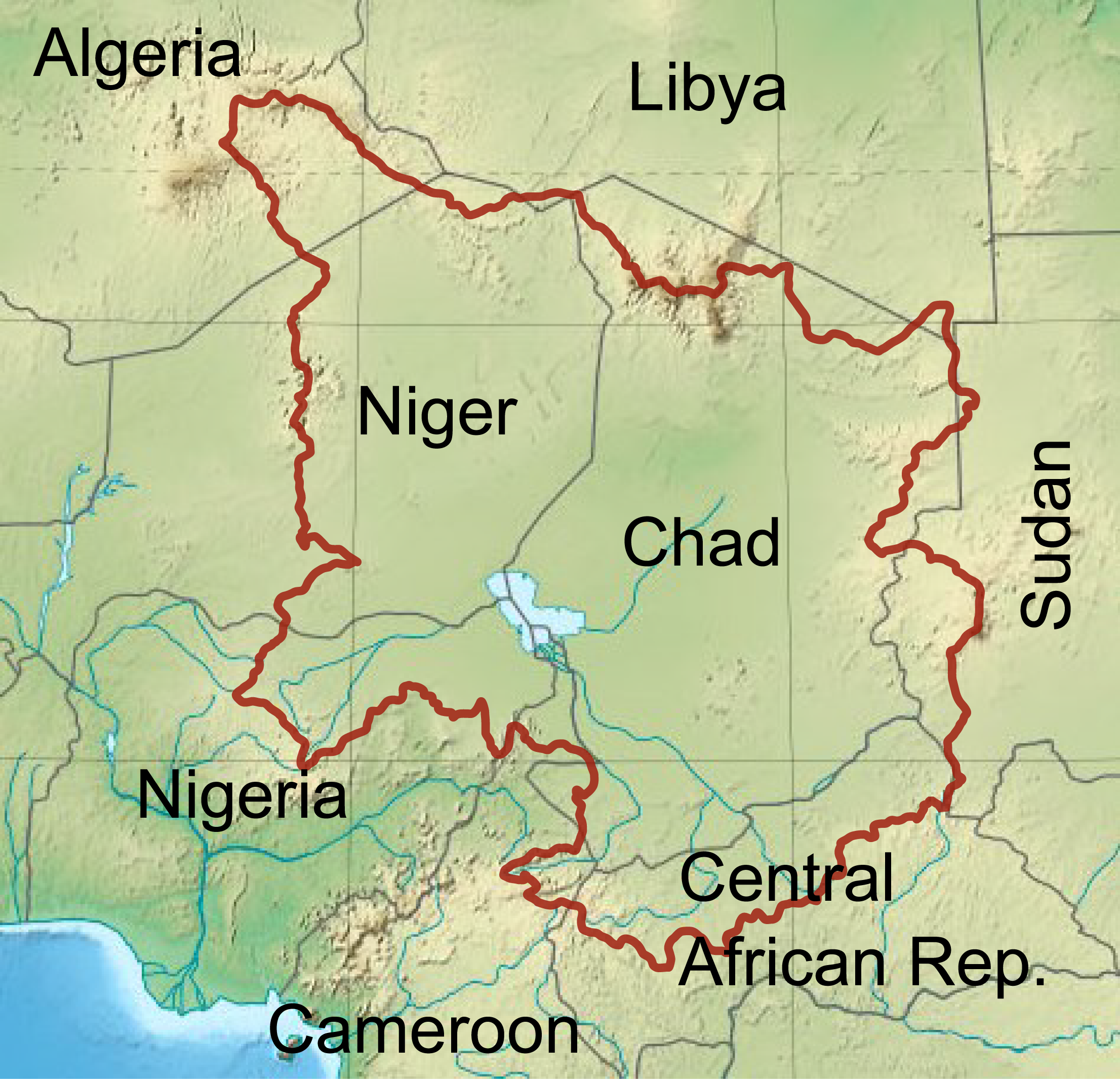|
Kanuri People
The Kanuri people (Kanouri, Kanowri, also Yerwa, Barebari and several subgroup names) are an African ethnic group living largely in the lands of the former Kanem and Bornu Empires in Niger, Nigeria, Chad, and Cameroon, as well as a diaspora community residing in Sudan. Those generally termed Kanuri include several subgroups and dialect groups, some of whom identify as distinct from the Kanuri. Most trace their origins to ruling lineages of the medieval Kanem–Bornu Empire, and its client states or provinces. In contrast to the neighboring Toubou or Zaghawa pastoralists, Kanuri groups have traditionally been sedentary, engaging in farming, fishing the Chad Basin, trade, and salt processing. Background Kanuri peoples include several subgroups, and identify by different names in some regions. The Kanuri language was the major language of the Bornu Empire and remains a major language in southeastern Niger, northeastern Nigeria and northern Cameroon, but in Chad it is limited t ... [...More Info...] [...Related Items...] OR: [Wikipedia] [Google] [Baidu] |
Ali Modu Sheriff
Ali Modu Sheriff (born 1956) is a Nigerian politician who served as governor of Borno State from 2003 to 2011. He was the first governor to serve two consecutive terms. Though Sheriff had held two elected offices as a member of All Nigeria People's Party, he would later join the All Progressives Congress becoming a founding member of that party. In 2014, Sheriff switched affiliation to the People's Democratic Party. He acted as the National Working Committee chair from 16 February 2016 until the National Convention, when he was removed and replaced by Ahmed Makarfi. On 26 April 2018, Sheriff defected back to All Progressives Congress. Background Ali Modu Sheriff was born in Ngala Town, Ngala Local Government Area, Borno State in 1956. His father was the business tycoon Modu Sheriff, who was also the Galadima of the Borno Emirate. He attended Government Secondary School, Bama (1974–1979). He attended the London School of Business, where he studied Insurance, Banking a ... [...More Info...] [...Related Items...] OR: [Wikipedia] [Google] [Baidu] |
Toubou People
The Toubou or Tubu (from Old Tebu, meaning "rock people") are an ethnic group native to the Tibesti Mountains that inhabit the central Sahara in northern Chad, southern Libya, northeastern Niger, and northwestern Sudan. They live either as herders and nomads or as farmers near oases. Their society is clan-based, with each clan having certain oases, pastures and wells. The Toubou are generally divided into two closely related groups: the Teda (or Tuda, Téda, Toda, Tira) and the Daza (or Dazzaga, Dazagara, Dazagada). They are believed to share a common origin and speak the Tebu languages, which are from the Saharan branch of the Nilo-Saharan language family. Tebu is divided further into two closely related languages, called '' Tedaga'' (Téda Toubou) and '' Dazaga'' (Daza Toubou). Of the two groups, the Daza, found to the south of the Teda, are more numerous. The Toubou people are also referred to as the Tabu, Tebu, Tebou, Tibu, 'Tibbu, Toda, Todga, Todaga, Tubu, Tuda, Tudag ... [...More Info...] [...Related Items...] OR: [Wikipedia] [Google] [Baidu] |
Bilma
Bilma is an oasis town and commune in north east Niger with, as of the 2012 census, a total population of 4,016 people. It lies protected from the desert dunes under the Kaouar Cliffs and is the largest town along the Kaouar escarpment. It is known for its gardens, for salt and natron production through evaporation ponds, date cultivation, and as the destination of one of the last Saharan caravan routes (the Azalai, from Agadez). Population Its population is mostly Kanuri, with smaller Toubou, Tuareg, and Hausa populations, the last being a reminder of Bilma's role as a key stop in the Trans Saharan trade. Administration and economy Bilma is the administrative seat of the Bilma Department, covering some of north eastern Niger. While it continues to produce salt in large ''natron'' salt pans, and this salt is still sold for livestock use throughout west Africa. Tourism (based out of Agadez and the Aïr Mountains some to the west) is of growing importance. Climate ... [...More Info...] [...Related Items...] OR: [Wikipedia] [Google] [Baidu] |
N'guigmi
N'guigmi is a city and Communes of Niger, Commune of fifteen thousand in the easternmost part of Niger, very near to Lake Chad – lying on its shore until the lake retreated. It is a crossroads for the traditional camel caravans of the Toureg and for traders plying North and South across the Sahara. Overview N'guigmi is a military centre for the region, a centre for the salt trade from Kaourar and is the last stop on the road to Chad. It is "the end of the road" and marks the end of the paved section of the Nigerien ''Route Nationale 1'', although the sections past Diffa are notorious for their poor condition. Two unpaved highways or caravan routes connect to N'guigmi from the north, providing the main road route between Chad and Niger, and one of two land routes to the Kaourar Oasis town of Bilma. The town lies at the mouth of the Dilia Bosso, an ancient river valley and seasonal wash that runs from the Termit Massif over 200 km to the northwest to what was the shore ... [...More Info...] [...Related Items...] OR: [Wikipedia] [Google] [Baidu] |
Zinder
Zinder (locally, ''Damagaram''), formerly also spelled Sinder, is the third largest city in Niger, with a population of 235,605 as by the 2012 census. It is situated east of the capital Niamey and north of the Nigerian city of Kano. History Early history Zinder was originally the site of the small Hausa village of Zengou.Geels, Jolijn, (2006) ''Bradt Travel Guide - Niger'', pgs. 213-26 The town grew dramatically in importance following the arrival of Kanuri aristocrats in 1736, who built a new fortified quarter called Birni to the south and declared the town of Zinder as the capital of the Sultanate of Damagaram in 1736. Thereafter Zinder became an important centre of the Trans-Saharan trade and a major hub for trade south through Kano and east to Bornu." The sultanate remained nominally subject to the Borno Empire until the reign of Sultan Tanimoune Dan Souleymane in the mid-to-late 19th century, who declared independence and initiated a phase of vigorous expansion. ... [...More Info...] [...Related Items...] OR: [Wikipedia] [Google] [Baidu] |
Bauchi State
Bauchi (Fula: ''Leydi Bauchi'' 𞤤𞤫𞤴𞤣𞤭 𞤦𞤢𞤵𞤷𞥅𞤭) is a States of Nigeria, state in the North East (Nigeria), North-East geopolitical zone of Nigeria. It is bordered by Jigawa State, Jigawa to the north, Yobe State, Yobe to the northeast, Gombe State, Gombe to the east, Taraba State, Taraba and Plateau State, Plateau to the south, Kaduna State, Kaduna to the west and Kano State, Kano to the northwest. It takes its name from the historic city of Bauchi (city), Bauchi, which also serves as its capital. The state was formed in 1976 when the former North-Eastern State was broken up. It originally included the area that is now Gombe State, which became a distinct state in 1996. Of the States of Nigeria, 36 states, Bauchi is the List of Nigerian states by area, fifth largest in area and also the List of Nigerian states by population, fifth most populous, with an estimated population of over 8,308,800 as of 2022. Geographically, the state is divided between ... [...More Info...] [...Related Items...] OR: [Wikipedia] [Google] [Baidu] |
Borno Emirate
The Borno Emirate or Sultanate, sometimes known as the Bornu Emirate, is a traditional Nigerian state that was formed at the start of the 20th century. It is headed by the descendants of the rulers of the Bornu Empire, founded before 1000. The rulers have the title Shehu of Borno (var. Shehu of Bornu, Sultan of Borno/u). The traditional emirate of Borno maintains a ceremonial rule of the Kanuri people, based in Maiduguri, Borno State, Nigeria, but acknowledged by the 4 million Kanuri in neighbouring countries. The current ruling line, the al-Kanemi dynasty, dates to the accession of Muhammad al-Amin al-Kanemi in the early 19th century, displacing the Sayfawa dynasty which had ruled from around 1300. History The old Bornu Empire collapsed in 1893 when the Funj warlord Rabih Zubayr ibn Fadlallah seized power and transferred the capital to Dikwa. When the French, then expanding in West Africa, defeated and killed Rabih they installed Shehu Sanda Kura, a member of the old ... [...More Info...] [...Related Items...] OR: [Wikipedia] [Google] [Baidu] |
Public Domain
The public domain (PD) consists of all the creative work to which no Exclusive exclusive intellectual property rights apply. Those rights may have expired, been forfeited, expressly Waiver, waived, or may be inapplicable. Because no one holds the exclusive rights, anyone can legally use or reference those works without permission. As examples, the works of William Shakespeare, Ludwig van Beethoven, Miguel de Cervantes, Zoroaster, Lao Zi, Confucius, Aristotle, L. Frank Baum, Leonardo da Vinci and Georges Méliès are in the public domain either by virtue of their having been created before copyright existed, or by their copyright term having expired. Some works are not covered by a country's copyright laws, and are therefore in the public domain; for example, in the United States, items excluded from copyright include the formulae of Classical mechanics, Newtonian physics and cooking recipes. Other works are actively dedicated by their authors to the public domain (see waiver) ... [...More Info...] [...Related Items...] OR: [Wikipedia] [Google] [Baidu] |
Chad Basin
The Chad Basin is the largest endorheic basin in Africa, centered approximately on Lake Chad. It has no outlet to the sea and contains large areas of semi-arid desert and savanna. The drainage basin is approximately coterminous with the sedimentary basin of the same name, but extends further to the northeast and east. The basin spans four modern nations, including most of Chad and a large part of Niger, Nigeria and Cameroon. A combination of dams, increased irrigation, climate change, and reduced rainfall are causing water shortages. Lake Chad continues to shrink. Geology The geological basin, which is smaller than the drainage basin, is a Phanerozoic sedimentary basin formed during the plate divergence that opened the South Atlantic Ocean. The basin lies between the West African craton, West African Craton and Congo craton, Congo Craton, and formed about the same time as the Benue Trough. It covers an area of about . It merges into the Iullemmeden Basin to the west at the Dame ... [...More Info...] [...Related Items...] OR: [Wikipedia] [Google] [Baidu] |
Agriculture
Agriculture encompasses crop and livestock production, aquaculture, and forestry for food and non-food products. Agriculture was a key factor in the rise of sedentary human civilization, whereby farming of domesticated species created food surpluses that enabled people to live in the cities. While humans started gathering grains at least 105,000 years ago, nascent farmers only began planting them around 11,500 years ago. Sheep, goats, pigs, and cattle were domesticated around 10,000 years ago. Plants were independently cultivated in at least 11 regions of the world. In the 20th century, industrial agriculture based on large-scale monocultures came to dominate agricultural output. , small farms produce about one-third of the world's food, but large farms are prevalent. The largest 1% of farms in the world are greater than and operate more than 70% of the world's farmland. Nearly 40% of agricultural land is found on farms larger than . However, five of every six farm ... [...More Info...] [...Related Items...] OR: [Wikipedia] [Google] [Baidu] |
Kanem–Bornu Empire
The Kanem–Bornu Empire was an empire based around Lake Chad that once ruled areas which are now part of Nigeria, Niger, Cameroon, Libya, Algeria, Sudan, and Chad. The empire was sustained by the prosperous trans-Saharan trade and was one of the oldest and longest-lived List of kingdoms and empires in African history, empires in African history. The foundation and early history of the Kanem–Bornu Empire is poorly known. The state is typically dated to have been founded around the year 700, though it may have been established centuries earlier or later. The ruling Duguwa dynasty ruled from their capital Njimi in the Kanem (region), Kanem region and used the ruling title ''List of mais of Kanem–Bornu, mai''. By the 11th century, the Duguwa had been replaced by the Sayfawa dynasty and the empire had converted to Islam. Economic factors and conflict with the Bilala people caused the empire to lose Kanem in the 14th century. ''Mai'' Omar I of Kanem, Omar I re-centered the empire i ... [...More Info...] [...Related Items...] OR: [Wikipedia] [Google] [Baidu] |
Bornu Empire
Bornu may refer to: * Bornu Empire, a historical state of West Africa * Borno State, Nigeria {{disambig ... [...More Info...] [...Related Items...] OR: [Wikipedia] [Google] [Baidu] |








